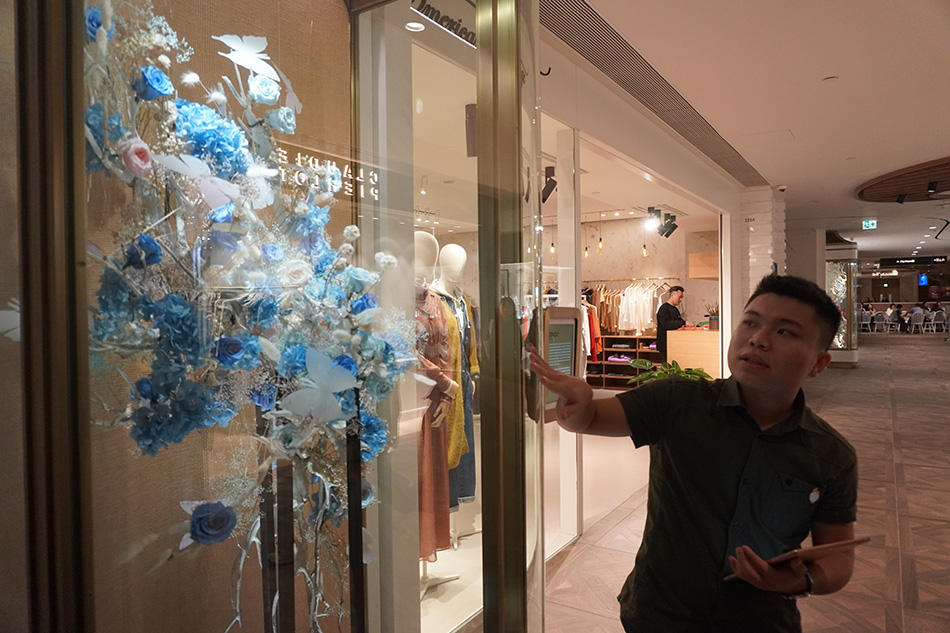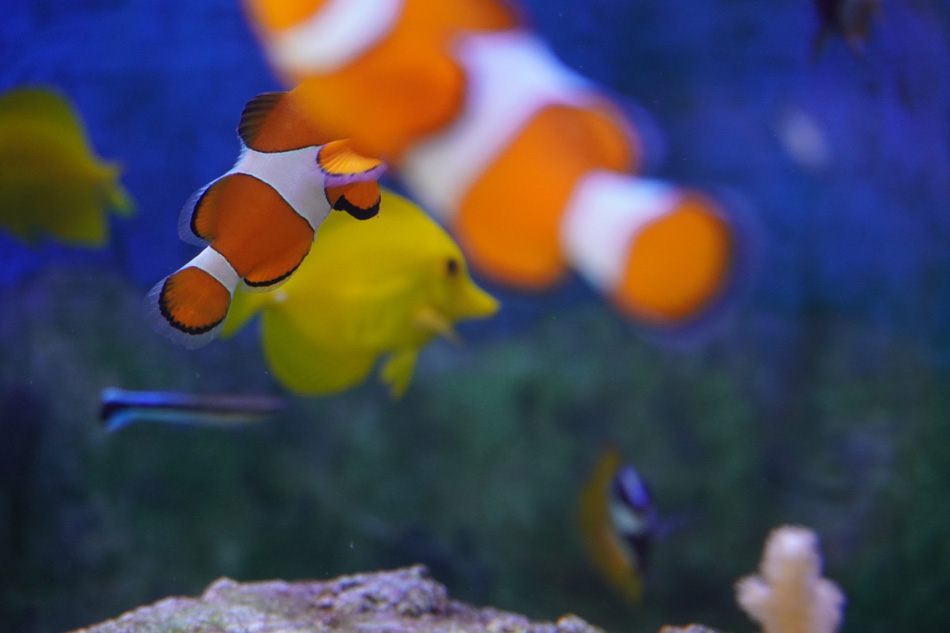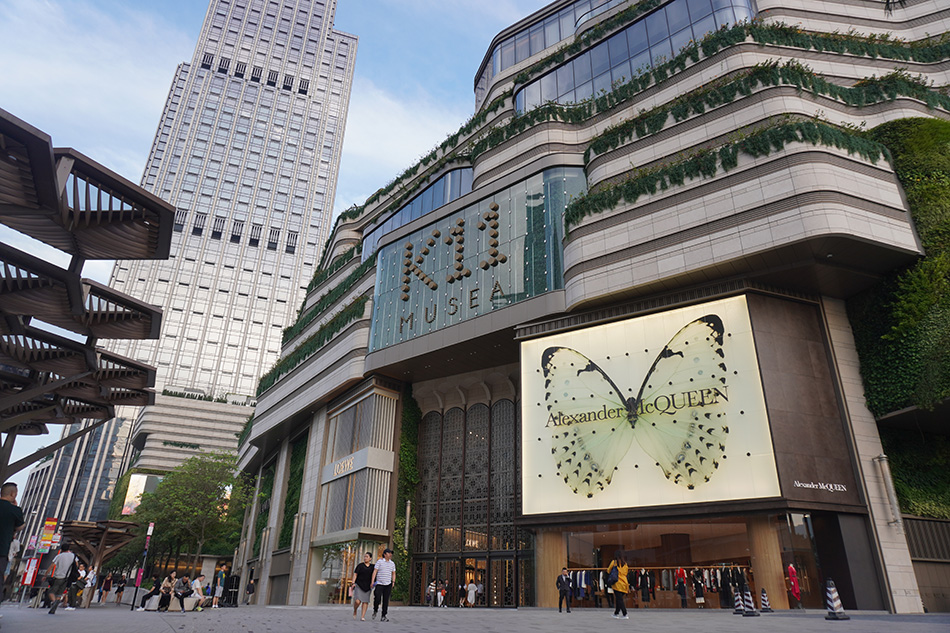Nature Discovery Park: Home to Hong Kong's 1st urban biodiversity museum | ABS-CBN
ADVERTISEMENT

Welcome, Kapamilya! We use cookies to improve your browsing experience. Continuing to use this site means you agree to our use of cookies. Tell me more!
Nature Discovery Park: Home to Hong Kong's 1st urban biodiversity museum
Nature Discovery Park: Home to Hong Kong's 1st urban biodiversity museum
Jan Yumul,
ABS-CBN News
Published Dec 28, 2019 09:19 AM PHT
HONG KONG - If you've decided not to give Hong Kong a miss in your travel plans next year, there's a new and family-friendly attraction fronting the prestigious Victoria Harbour giving both locals and tourists' shopping and dining experiences a different twist.
HONG KONG - If you've decided not to give Hong Kong a miss in your travel plans next year, there's a new and family-friendly attraction fronting the prestigious Victoria Harbour giving both locals and tourists' shopping and dining experiences a different twist.
Derailing from the city's rooftop bar trend is the K11 Concepts Group, whose parent company is the Cheng-owned Hong Kong property giant New World Development Group, which bet some US$2.6 billion to revitalize the Victoria Dockside.
Derailing from the city's rooftop bar trend is the K11 Concepts Group, whose parent company is the Cheng-owned Hong Kong property giant New World Development Group, which bet some US$2.6 billion to revitalize the Victoria Dockside.
Included in that multibillion-dollar vision is K11 Group founder, cultural, and third-generation tycoon Adrien Cheng's Nature Discovery Park, located on the 8th floor of the luxurious K11 Musea mall in Salisbury Road in Tsim Sha Tsui. It is the city's pioneering urban biodiversity museum and education park.
Included in that multibillion-dollar vision is K11 Group founder, cultural, and third-generation tycoon Adrien Cheng's Nature Discovery Park, located on the 8th floor of the luxurious K11 Musea mall in Salisbury Road in Tsim Sha Tsui. It is the city's pioneering urban biodiversity museum and education park.
The park boasts 2,000 sq. ft. of space that's nestled above the iconic Kowloon waterfront, offering guests green tours and events in association with the Jane Goodall Institute (Hong Kong), founded by UN Peace Ambassador Dr. Jane Goodall.
The park boasts 2,000 sq. ft. of space that's nestled above the iconic Kowloon waterfront, offering guests green tours and events in association with the Jane Goodall Institute (Hong Kong), founded by UN Peace Ambassador Dr. Jane Goodall.
ADVERTISEMENT
The Nature Discovery Tour walks guests through the K11 Musea mall where artistic floral installations scatter, said to be made up of over 180 exotic and native plant species. Other workshops like "Farm-to-Face" beauty product making, including a tutorial on handmade soap, is also on offer. The platform also provides opportunities for local products from social enterprise.
The Nature Discovery Tour walks guests through the K11 Musea mall where artistic floral installations scatter, said to be made up of over 180 exotic and native plant species. Other workshops like "Farm-to-Face" beauty product making, including a tutorial on handmade soap, is also on offer. The platform also provides opportunities for local products from social enterprise.
Youngsters and their families can subscribe to the urban farming experience for basic farming techniques and get the chance to grow seasonal vegetable, fruits and herbs.
Youngsters and their families can subscribe to the urban farming experience for basic farming techniques and get the chance to grow seasonal vegetable, fruits and herbs.
The entrance fee is at HK$60 (almost P400) for adults but is free for children aged 2 and below.
The entrance fee is at HK$60 (almost P400) for adults but is free for children aged 2 and below.
If you decide to do the guided tours, the fees, which already incorporates the admission fee to Nature Discovery Park, cost HK$200 (P1,300) for adults, HK$100 (P650) for those aged 3 to 18, but is free of charge for those 2 or below.
If you decide to do the guided tours, the fees, which already incorporates the admission fee to Nature Discovery Park, cost HK$200 (P1,300) for adults, HK$100 (P650) for those aged 3 to 18, but is free of charge for those 2 or below.
The park is also home to a large outdoor aquarium showcasing Hong Kong's rich marine life with various species of fish and corals.
The park is also home to a large outdoor aquarium showcasing Hong Kong's rich marine life with various species of fish and corals.
ADVERTISEMENT
But long before the K11 group's "Silicon Valley of Culture" aspirations, the TST promenade where the edifice stands, operated as Holt's Wharf godown terminal. It was once home to the Kowloon Canton Railway, propelling the area to a vital freight hub as British-colony Hong Kong developed in between World Wars.
But long before the K11 group's "Silicon Valley of Culture" aspirations, the TST promenade where the edifice stands, operated as Holt's Wharf godown terminal. It was once home to the Kowloon Canton Railway, propelling the area to a vital freight hub as British-colony Hong Kong developed in between World Wars.
According to the Industrial History of Hong Kong Group, the wharf opened in 1910 and was jointly owned by John Swire and Sons and Blue Funnel Line.
According to the Industrial History of Hong Kong Group, the wharf opened in 1910 and was jointly owned by John Swire and Sons and Blue Funnel Line.
"In 1971, Swire Group and Blue Funnel Line sold the wharf site to New World Development. Two years later in 1973 the latter company commenced the construction of the New World Center and the Regent Hong Kong, which is now known as InterContinental Hong Kong, the website reads.
"In 1971, Swire Group and Blue Funnel Line sold the wharf site to New World Development. Two years later in 1973 the latter company commenced the construction of the New World Center and the Regent Hong Kong, which is now known as InterContinental Hong Kong, the website reads.
K11 Musea is considered 'the final and most important piece of the 10-year regeneration of Victoria Dockside'.
K11 Musea is considered 'the final and most important piece of the 10-year regeneration of Victoria Dockside'.
"I think for Hong Kong this is quite new of a concept. And the fact that we're located at the rooftop of a very urban mall is a surprise to everybody," said Ellie Tang, head of sustainability, New World Development Company Limited and general manager for sustainability at K11 Concepts Limited.
"I think for Hong Kong this is quite new of a concept. And the fact that we're located at the rooftop of a very urban mall is a surprise to everybody," said Ellie Tang, head of sustainability, New World Development Company Limited and general manager for sustainability at K11 Concepts Limited.
ADVERTISEMENT
Tang told ABS-CBN News they try to pack in a lot of different concept and experiences within a small rooftop space and with an urban farm, with a multi-purpose event space. There is also a lot of thought put into the landscaping "to ensure that we're protecting local species, preserving some of the older trees from the original project site and also pay respect to our ocean".
Tang told ABS-CBN News they try to pack in a lot of different concept and experiences within a small rooftop space and with an urban farm, with a multi-purpose event space. There is also a lot of thought put into the landscaping "to ensure that we're protecting local species, preserving some of the older trees from the original project site and also pay respect to our ocean".
Efforts put into the design not only stem from sustainability as the way forward, but is shaped by Hong Kong's compactness. Hong Kong, Tang says, is 'very dense with a lot of skyscrapers' and opines that a lot of the city's rooftop spaces are wasted, some painted with dark coating and are riddled with mechanical systems.
Efforts put into the design not only stem from sustainability as the way forward, but is shaped by Hong Kong's compactness. Hong Kong, Tang says, is 'very dense with a lot of skyscrapers' and opines that a lot of the city's rooftop spaces are wasted, some painted with dark coating and are riddled with mechanical systems.
"It's not very ecstatically pleasing, one, and two it's underutilized. And the worst of all, this contributes to what we call 'heat island effect'. So, because the dark colour coating on rooftop usually absorbs more heat from the sun, the building itself would use more energy to improve ventilation or keep it cool basically," said Tang.
"It's not very ecstatically pleasing, one, and two it's underutilized. And the worst of all, this contributes to what we call 'heat island effect'. So, because the dark colour coating on rooftop usually absorbs more heat from the sun, the building itself would use more energy to improve ventilation or keep it cool basically," said Tang.
"But since K11 Musea is a retail destination after all, we don't want to waste the rooftop space per se so we decided to curate a journey with the green roof, so basically to make this green roof functional," she added.
"But since K11 Musea is a retail destination after all, we don't want to waste the rooftop space per se so we decided to curate a journey with the green roof, so basically to make this green roof functional," she added.
K11 Musea's green building certifications include the Hong Kong BEAM Plus (Gold LEVEL) and the US LEED Gold Level Certification.
K11 Musea's green building certifications include the Hong Kong BEAM Plus (Gold LEVEL) and the US LEED Gold Level Certification.
ADVERTISEMENT
The LEED or Leadership in Energy and Environmental Design is a globally used green building rating system with certification points earned across several categories such as location and transportation, sustainable sites, water efficiency, energy and atmosphere, to name but a few. The LEED rating levels, based on the number of points achieved, are certified, silver, gold or platinum.
The LEED or Leadership in Energy and Environmental Design is a globally used green building rating system with certification points earned across several categories such as location and transportation, sustainable sites, water efficiency, energy and atmosphere, to name but a few. The LEED rating levels, based on the number of points achieved, are certified, silver, gold or platinum.
The attraction is accessible by the MTR (Mass Transit Railway), bus, taxi, and even the Star Ferry.
The attraction is accessible by the MTR (Mass Transit Railway), bus, taxi, and even the Star Ferry.
The sustainability head though seems to have moved past the enthusiasm over certifications. And for one thing, it is raising the lack of awareness on urban farming, and that fruit need to be grown seasonally.
The sustainability head though seems to have moved past the enthusiasm over certifications. And for one thing, it is raising the lack of awareness on urban farming, and that fruit need to be grown seasonally.
"You lose sight of that in the city right because everything is at your finger tips. You go to the grocery , (it's)nicely packaged,, you can get all types of fruit and vegetables all year round, but if you really want to understand urban farming in the context of one particular city, you need to, one, pay attention to the the growing cycle. And even what time of the day you're sowing the seeds determines the growth as well, so it's just an art in itself. There's so much to learn. And with, I think, climate change increasingly having an impact on different weather events, we have to update our knowledge," said Tang.
"You lose sight of that in the city right because everything is at your finger tips. You go to the grocery , (it's)nicely packaged,, you can get all types of fruit and vegetables all year round, but if you really want to understand urban farming in the context of one particular city, you need to, one, pay attention to the the growing cycle. And even what time of the day you're sowing the seeds determines the growth as well, so it's just an art in itself. There's so much to learn. And with, I think, climate change increasingly having an impact on different weather events, we have to update our knowledge," said Tang.
Tang says right now they don't have plans of rolling out the full model of Nature Discovery Park in their businesses in Hong Kong and across Mainland China, which also have "urban farming corners" in Shanghai, their Wuhan Project in Shenyang, and Guangzhou, to name but a few. Their focus is to run full-blown engagement workshops and education programs that are offered regularly instead
Tang says right now they don't have plans of rolling out the full model of Nature Discovery Park in their businesses in Hong Kong and across Mainland China, which also have "urban farming corners" in Shanghai, their Wuhan Project in Shenyang, and Guangzhou, to name but a few. Their focus is to run full-blown engagement workshops and education programs that are offered regularly instead
ADVERTISEMENT
"It's a first attempt. But I think there are still a lot of opportunities for trial and error so if we find our strengths in a particular part of the revenue model, business model, then, we may roll them," said Tang.
"It's a first attempt. But I think there are still a lot of opportunities for trial and error so if we find our strengths in a particular part of the revenue model, business model, then, we may roll them," said Tang.
ADVERTISEMENT
ADVERTISEMENT







